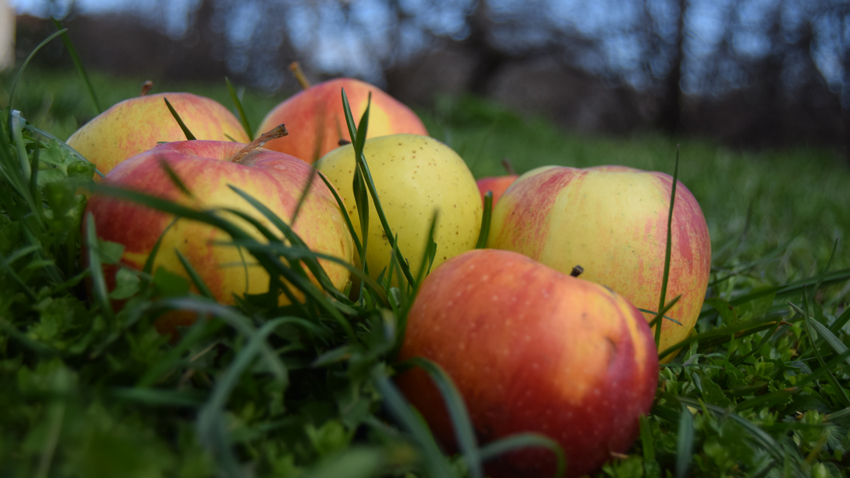Different demographic and social factors have resulted in the abandoning of many traditional orchards in Bulgaria over the past years. This does reduce varietal diversity, depriving us from precious sorts of fruit trees. The Culinary Secrets of Nature 3 campaign will take place in April 2016, as part of the initiative for preservation of traditional fruit tree sorts. The goal is the restoration of the now vanishing Petrovka, Aivania and Buhavitsa sorts of apple trees, enlisted as endangered. The WWF, the Friends of the Vratsa Balkan Club and a chain of restaurants, offering traditional cuisine from the area – these are the initiators. Thus money will be collected for the cause. WWF’s Raina Popova comments more on the subject:
 “When one goes to the grocery store for apples, their origin is rarely questioned. Most often those are not Bulgarian. Only the village yards of our grandparents now host these apple sorts, but not the stores. Hence the initiative, aiming at the preservation of biodiversity and the popularization of those sorts. Anyone can contribute to the cause. You don’t have to be a fruit-grower, in order to create an orchard. We welcome such self-initiatives, but even a few saplings planted in front of the block of flats could support the biodiversity.”
“When one goes to the grocery store for apples, their origin is rarely questioned. Most often those are not Bulgarian. Only the village yards of our grandparents now host these apple sorts, but not the stores. Hence the initiative, aiming at the preservation of biodiversity and the popularization of those sorts. Anyone can contribute to the cause. You don’t have to be a fruit-grower, in order to create an orchard. We welcome such self-initiatives, but even a few saplings planted in front of the block of flats could support the biodiversity.”
A model orchard will be developed on the territory of the natural park with the purpose of the Bulgarian sorts’ preservation. It will be a demo center, providing information. The garden will be maintained by volunteers so far, but the WWF hopes that one day it will turn into a genetic bank. However, what makes it so important to consume local fruit sorts?

“We grow up within the same climate as the fruit trees around, which automatically means we are most suitable for each other in terms of body and immunity. Thus we not only support local business, but we find meaning for ourselves. The goal of the initiative is to reach more people, as consumers are the ones who dictate the rules. We need and look for quality, being ready to pay for it.”
 Teacher Georgi Ivanov says the same, as orcharding is his second occupation, inherited from his parents. He grows traditional and less known sorts of apples and cherries in the village of Dragovishtitsa, near the town of Kyustendil. Georgi loves what he does, but admits that Bulgarian fruiters do face difficulties:
Teacher Georgi Ivanov says the same, as orcharding is his second occupation, inherited from his parents. He grows traditional and less known sorts of apples and cherries in the village of Dragovishtitsa, near the town of Kyustendil. Georgi loves what he does, but admits that Bulgarian fruiters do face difficulties:
“Taste is not looked for these days – people want a minimum of 25 mm in diameter for the cherries, even measuring those. The traditional Kyustendil cherry, really tasteful, has lost its previous positions. Plants should have been opened for the purchase and processing of those fruits, but there is no development. For instance, last year people here produced more than a ton of cherries each, but the purchase centers refused to buy them and closed. The cherries were good for nothing in less than a couple of days. They laugh at us in terms of attitude and prices. I see the solution in the broader advertising of our production. There should be competition and not a single buyer. We can’t compete with the neighboring countries, as cherries ripen earlier there and the subsidies are much bigger,” Georgi Ivanov says in conclusion.

English version: Zhivko Stanchev
Photos: wwf.bg and Luiza Lazarova“The end is near – let’s go out with style!” This is the motto of the 2026 Gabrovo Carnival, marking the start of the so-called fifth season of the year – the carnival season. The 11th day of the 11th month ushers in the carnival season..
Bulgarian compatriot Nina Vasileva-Zaneshev is one of the examples among the diaspora abroad, who give us confidence that wherever they are in the world, Bulgarian communities will not lose their connection with Bulgaria. Born in a..
Minister of the Environment and Water Manol Genov has granted two centuries-old trees – each of which approximately 200 years old – protected status, the ministry has announced. One of them, a European white elm (Ulmus laevis), is 24 metres tall..
Italy investigates claims of hunting of people in Sarajevo in the 1990s The prosecutor's office in Milan has..
Albania and Bulgaria have joined forces in the name of one more child being born. In the late afternoon of November 7, the first-ever free reproductive..
The diplomas from the 11th master class in radio journalism of the Bulgarian National Radio – BNR Academy were awarded at a solemn ceremony on November..

+359 2 9336 661
